




语法口诀轻松记
1. be 动词的过去式,只有 was,were
2. am,is 换 was
3. are 变作 were
1. be 动词的过去式,只有 was,were
be 动词的过去式形态,只有 was 和 were 两种。
2. am,is 换 was
I am → I was;he is → he was。
3. are 变作 were
you are → you were;they are → they were。
语法概念说给你听
(一)be 动词的现在式和过去式比较
1. 现在式:am / is / are
2. 过去式:was / were

(二)实义动词过去式的变化方式
实义动词的过去式变化方式,不分人称,一律在词尾加上-(e)d,但是存在一些不规则变化的情况,在后面的章节中会另作介绍。
(三)动词过去式的使用场合
1. 常见的使用场合包括以下几种:
(1) yesterday (morning / afternoon / evening) 昨天(早上 / 下午 / 傍晚)
(2) this morning 今天早上
(3) last night 昨晚
(4) last week 上个星期
(5) last Saturday 上周六
(6) last year 去年
(7) last September 去年九月
2. 以下这几种场合也适用于动词的过去式,但经常被误用,所以要特别注意:
(1) before 以前
(2) ...(three days) ago ……(三天)以前
※ ago 不可以单独使用,一定要在前面加上一段时间。
(3) the day before yesterday 前天
(4) the other day 前几天
(5) in the past 在过去
(6) then ( = at that time) 那时候
(7) in 2001 在 2001 年(过去)
图解语法一看就懂
动词的现在式 → 动词的过去式的变化技巧

例句现身说法好清楚
1. I was late for school this morning. 我今天早晨上学迟到了。
2. We were at the party last night. 我们昨晚在派对上。
3. Sherry was short before, but she is tall now.
雪莉以前矮,但现在她长高了。
4. They were in the same class last year, but they are in different classes now.
他们去年在同一个班,但现在他们不同班。
5. Eric was heavy before, but he is thin now.
艾瑞克以前胖,但现在他瘦了。
语法概念说给你听
以下是 be 动词过去式的否定句与疑问句的表示方法:
(一)否定句:be动词 + not
was not = wasn't
were not = weren't
例如:He was not at home last night. 他昨天晚上不在家。
(二)疑问句:be动词在句首
Was... ? / Were... ?
例如:Was he at home last night? 他昨天晚上在家吗?
(三)否定疑问句:be动词+not在句首
Wasn't... ? / Weren't... ?
例如:Wasn't he at home last night? 他昨天晚上不在家吗?
图解语法一看就懂
be 动词过去式的否定句和疑问句
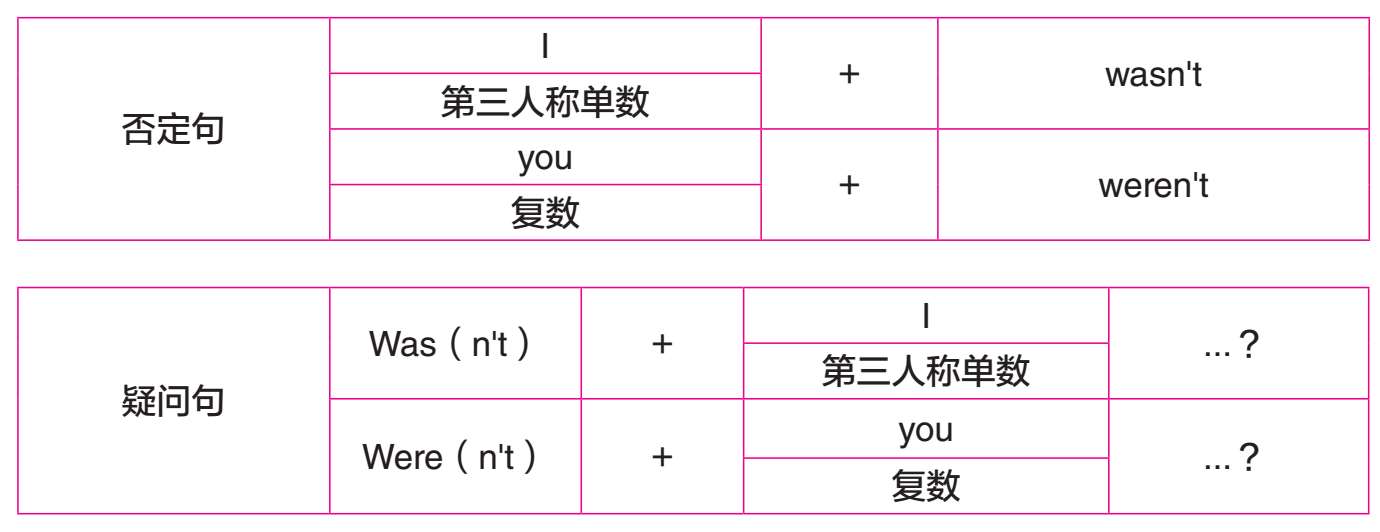
例句现身说法好清楚
1. You were in America last month. 你上个月在美国。
2. You were't in America last month. → 否定 你上个月不在美国。
3. Were you in America last month? → 疑问 你上个月在美国吗?
4. Weren't you in America last month? → 否定疑问
= Were you not in America last month? 你上个月不在美国吗?
5. Was he late yesterday? 他昨天迟到了吗?
→Yes, he was. → 肯定简答 是的,他迟到了。
→No, he wasn't. → 否定简答 不,他没有。
→Yes, he was late yesterday. → 肯定详答 是的,他昨天迟到了。
→No, he wasn't late yesterday. → 否定详答 不,他昨天没有迟到。
马上演练好实力
选选看:请从选项中选出符合题意的答案
( ) 1. Tom ______ busy this morning.
A. is B. was C. are D. were
( ) 2. I ______ at my shop yesterday.
A. am not B. wasn't C. weren't D. aren't
( ) 3. ______ he at home last night?
A. Is B. Are C. Were D. Was
( ) 4. Were you happy at the party last Saturday? Yes, ______.
A. I were B. I was C. you were D. you was
( ) 5. Jenny and John ______ neighbors before.
A. was B. were C. is D. are
( ) 6. Was your uncle busy last weekend? No, ______.
A. he isn't B. my uncle wasn't
C. he wasn't D. he weren't
( ) 7. He was late for work yesterday, but we ______.
A. weren't B. were C. wasn't D. was ( )
8. The river ______ clean before, but now it is dirty.
A. were B. are C. is D. was
公布答案
1. B 2. B 3. D 4. B
5. B 6. C 7. A 8. D

今日重点回顾笔记
一定要练习写下来!才能确定自己真的掌握了!
1. be动词的过去式,可分成____________和____________。
2. 主语I/第三人称单数搭配使用____________;主语you/复数搭配使用____________。
3. 否定句可将was not缩写成____________;were not缩写成____________。
● 判断句子是否正确,若不正确,请更正。
A. Your classmate was late today.
_______________________________________
B. I were sorry about that bad news.
_______________________________________
C. He weren't at home yesterday.
_______________________________________
正确答案
1. was ; were 2. was ; were 3. wasn't ; weren't
A. 正确。
B. 错误,应为:I was sorry about that bad news.
主语I的be动词过去式要用was。
C. 错误,应为:He wasn't at home yesterday.
主语He的be动词过去式的否定形式用wasn't。
语法口诀轻松记
1. 实义动词过去式,规则变化加 -ed
2. 词尾加 -ed,有 -e 就加 -d
3. -y 的前面是辅音,去 -y 加上 -ied
4. 短元音要注意,双写词尾加 -ed
1. 实义动词过去式,规则变化加 -ed
实义动词过去式,在词尾加上-ed作规则变化。
2. 词尾加 -ed,有 -e 就加 -d
通常在实义动词词尾加上 -ed 就是过去式,例如:played。如果词尾已经有 -e 则只需要加 -d,例如 closed。
3. -y的前面是辅音,去-y加上-ied
-y 的前面如果是辅音就要去 -y 加上 -ied,例如:study → studied。
4. 短元音要注意,双写词尾加-ed
辅音结尾,而且其前面的元音为短元音,就必须双写词尾字母加 -ed,例如:jog → jogged。
语法概念说给你听
前面我们学过了 be 动词的过去式,只有was 和 were 两个。而实义动词却有规则和不规则变化之分:
(一)规则变化
1. 通常在词尾加 -ed,即可代表过去式
比如cooked(煮)/ played(玩),需注意 -ed 的读音。
2. 其他的规则变化见下表
(二) 不规则变化
有口诀,用技巧,保证让你快速学会!(详述于后文)
图解语法一看就懂
过去式规则变化的动词
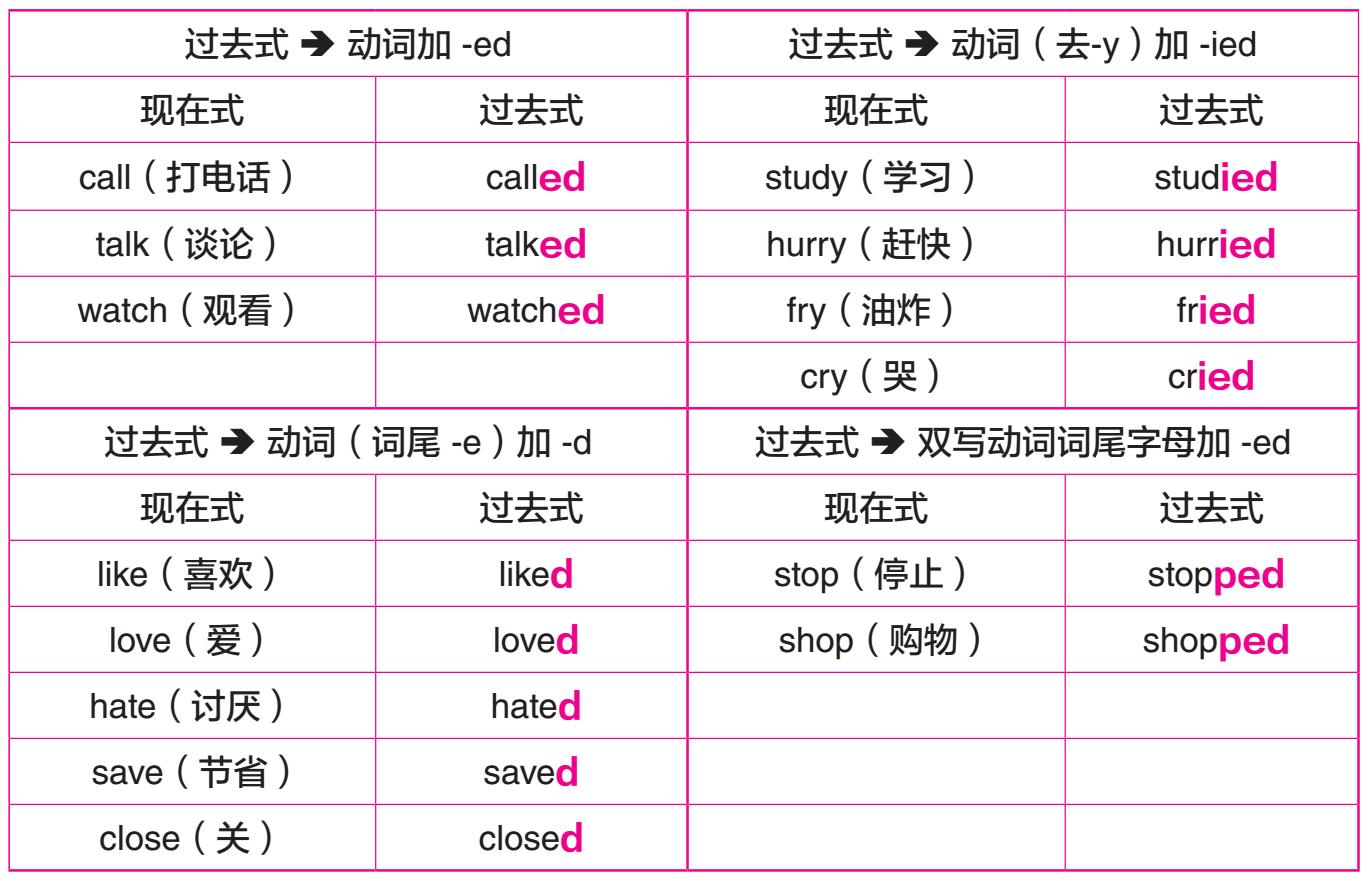
-ed 发音读读看

例句现身说法好清楚
1. My brother watches TV every day. 我弟弟每天看电视。
→My brother watched TV last night. 我弟弟昨晚看电视了。
2. Amanda studies English every morning. 阿曼达每天早上学习英文。
→Amanda studied English yesterday afternoon. 阿曼达昨天下午学习了英文。
3. They played baseball after school yesterday. 他们昨天放学后打棒球了。
4. He hurried home to tell us the news. 他匆匆赶回家告诉了我们这个消息。
5. It rained a lot yesterday evening. 昨天晚上下了很大的雨。
6. Mary invited me to the party. 玛莉邀请了我参加派对。
语法口诀轻松记
1. 这些动词很有趣,过去元音都是a
2. 游泳完,跑过来 ,坐下来,唱首歌,摇个铃
3. 就给你喝水,预备开始,原谅我变得这么厉害
1. 这些动词很有趣,过去元音都是a
将下列11个动词的元音字母改为a,就可以变成过去式。
2. 游泳完,跑过来 ,坐下来,唱首歌,摇个铃
swim变swam,run变ran,come变came,sit变sat,sing变sang,ring变rang。
3. 就给你喝水,预备开始,原谅我变得这么厉害
give变gave,drink变drank,begin变began,forgive变forgave,become变became。
语法概念说给你听
(一)不规则变化的动词
可以归纳出常用的 11 个动词,只要将这些动词的元音字母改成a,即可变为过去式。例如:swim 变成 swam , run 变成 ran。
(二)实义动词过去式不规则变化的用法
动词的现在式需注意主语人称的变化,过去式则不需区分。
例1:He swims very well. → He swam very well. 他游得很好。
例2:You swim very well. → You swam very well. 你游得很好。
例3:He runs very fast. → He ran very fast. 他跑得很快。
例4:You run very fast. → You ran very fast. 你跑得很快。
图解语法一看就懂
以下是归纳出的11个动词,其变为过去式时要将元音字母变成a

例句现身说法好清楚
1. My brother swims every day.
我弟弟每天游泳。
→ My brother swam very well yesterday.
我弟弟昨天游泳游得很好。
2. She sang an English song for us.
她为我们唱了一首英文歌。
3. They came here on business last Monday.
他们上周一来这里出差。
4. She became a famous writer.
她成了一位有名的作家。
5. I forgave him for his rudeness.
我原谅了他的无礼。
6. My father drank a lot of beer.
我爸爸喝了很多啤酒。
7. It began to rain cats and dogs outside.
外面开始下起了倾盆大雨。
语法概念说给你听
你还在一个一个背动词过去式的不规则变化吗?其实,只要按照下列技巧,即可轻松记住动词过去式的不规则变化:
(一)保留词首辅音+ ought / aught,读作 [ɔ:t]
例如:buy → bought
(二)元音 i–e → o–e,例如:write → wrote
(三)元音 ea → o–e,例如:wear → wore
(四)过去式与动词原形一样
比如cut(切)/ put(放),其过去式与原形一样,但需注意与现在式的区别,尤其是主语为第三人称单数时。
例如: 现在式:He puts his textbooks on the table by the window.
过去式:He put his textbooks on the table by the window.
他把课本放在窗边的桌上。
注意:第三人称单数现在式,动词需加 -s。
图解语法一看就懂
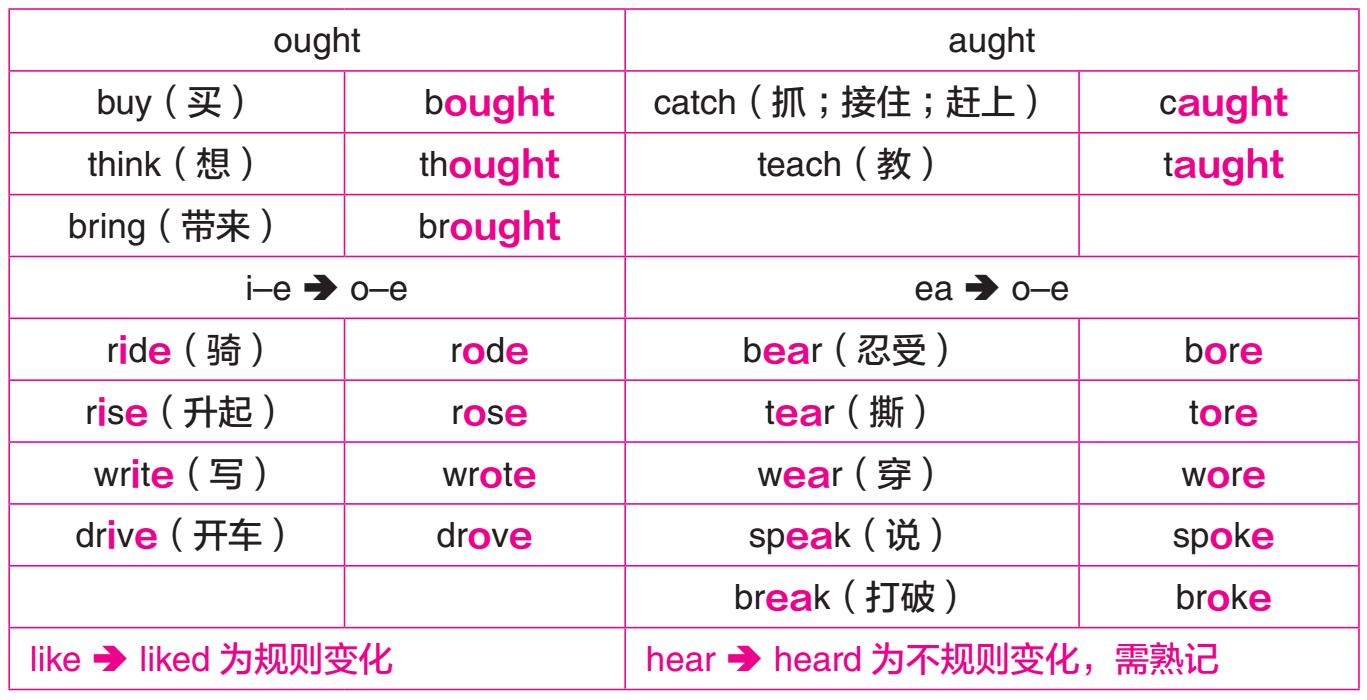
过去式与原形一样,不发生变化的动词过去式与原形相同但读音不同的特殊动词


例句现身说法好清楚
1. Mother bought me a new pair of shoes. 妈妈给我买了一双新鞋子。
2. The policeman caught the thief. 警察抓住了小偷。
3. I rode home on my bicycle. 我骑自行车回家。
4. I wrote Jack that his father was not well.
我写信给杰克,告诉他他的父亲身体欠佳。
5. Frank fell down and broke his leg. 弗兰克跌倒了,并把腿摔断了。
6. He read an English book last week. 他上周读了一本英文书。
注意:read 在此为过去式,现在式应写作 He reads...
7. John quit his job last month. 约翰上个月辞职了。
语法概念说给你听
再教你几个技巧,让你以群组方式记住下列常见动词的过去式不规则变化:
1. 词尾辅音 d → t,例如:lend → lent
2. 词尾 ay → aid,例如:say → said
3. 词尾 ow → ew,例如:grow → grew
4. 元音 ee → e–t,例如:keep → kept
图解语法一看就懂
只要按照下列技巧,按其变化规则即可轻松记住这些动词的过去式

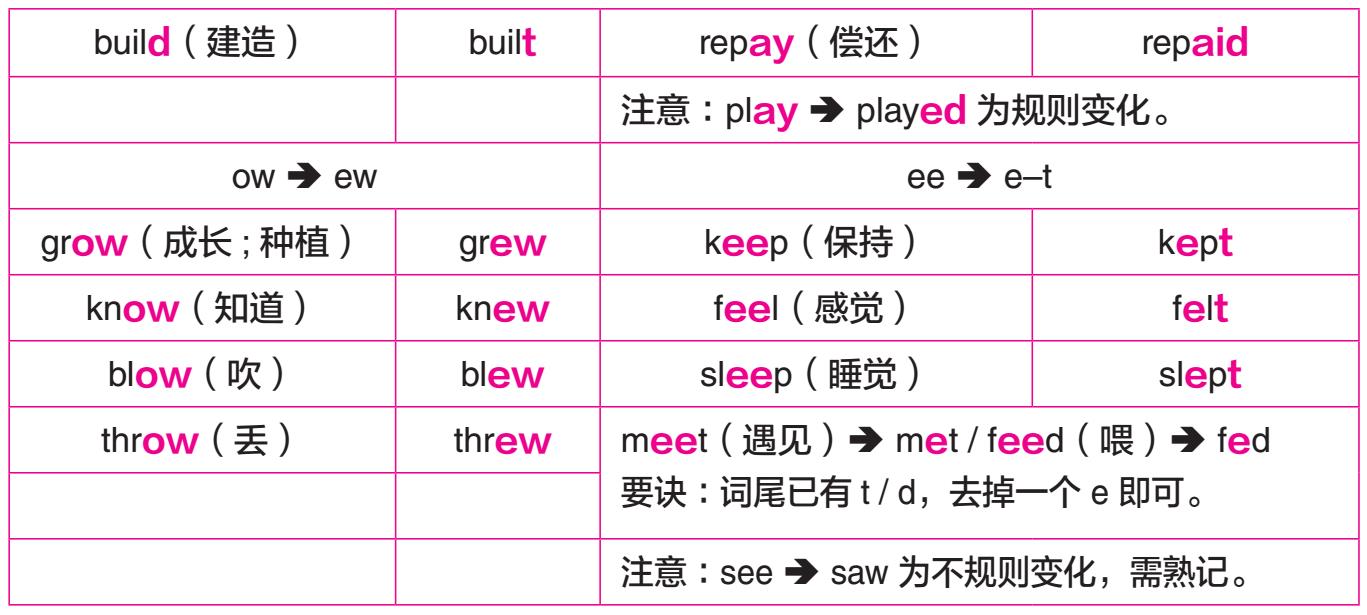
例句现身说法好清楚
1. I spent 300 yuan on the hat. 我花了三百元买了这顶帽子。
2. Who lent you the dictionary? 谁借给了你这本词典?
3. We paid a very high price for the house. 我们花高价买下了这栋房子。
4. They grew some vegetables last year. 他们去年种了一些蔬菜。
5. I slept very well last night. 昨天夜里我睡得很好。
语法概念说给你听
因为有些动词的过去式变化是没有规则可循的,所以必须熟记,但如果利用颜色标示出其变化的地方,可以加强记忆!例如:get → got , take → took , hear →heard。
另外,还可利用发音来帮助记忆,常常读的话自然就容易记住。下面就列举出常用的 25 个不规则变化动词。
图解语法一看就懂
反复朗读这些动词的过去式,会有助于你的记忆
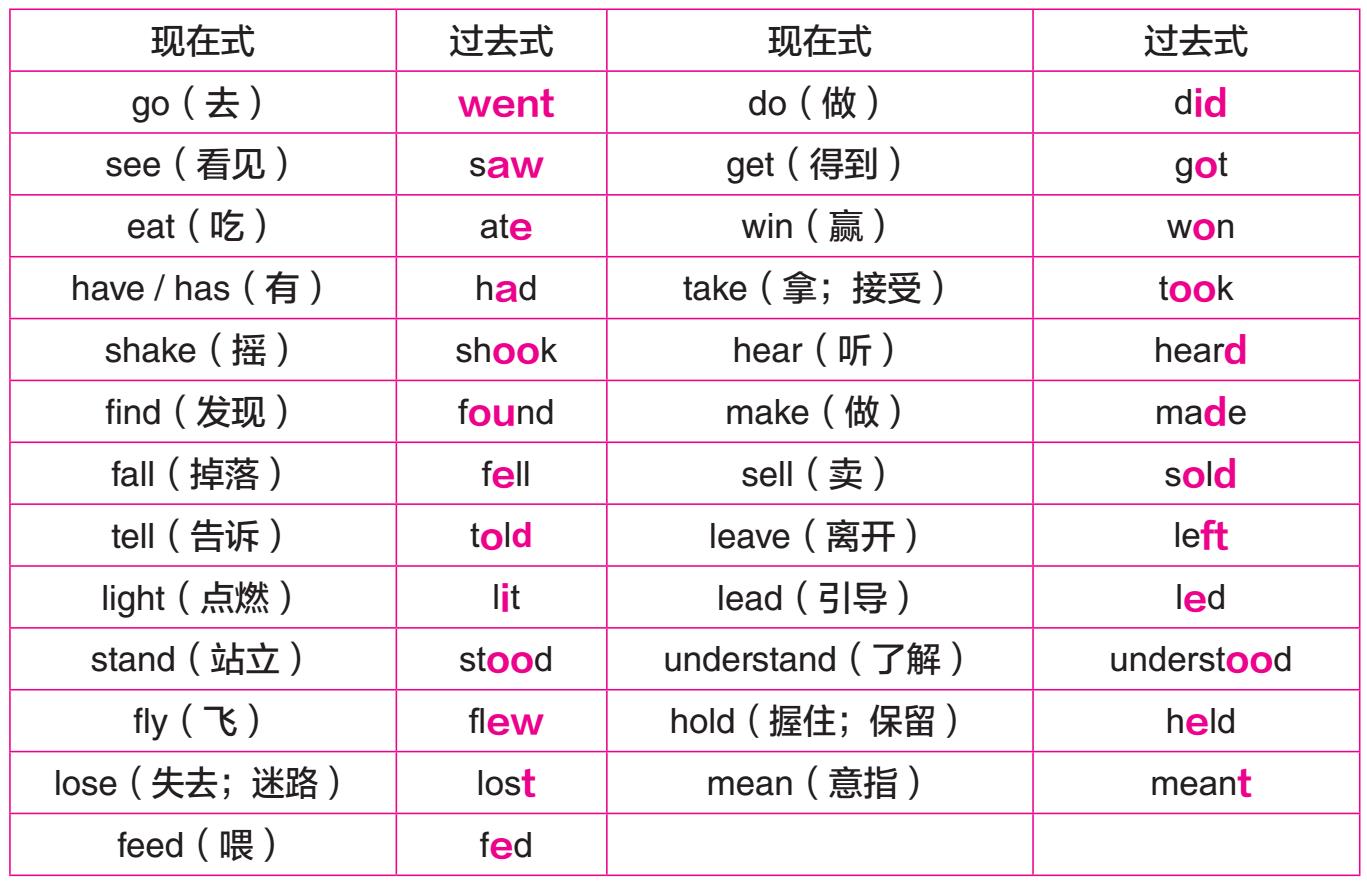
例句现身说法好清楚
1. Mr. Lin went to work by car yesterday morning.
昨天早上林先生开车去上班。
2. I saw an accident on my way home.
我在回家途中目睹了一起意外事故。
3. Frank ate fish for dinner yesterday evening.
昨天晚上弗兰克晚餐吃了鱼。
4. I heard that she was ill.
我听说她生病了。
5. When I got home, I found a gift on my desk.
我回到家的时候,发现书桌上有个礼物。
6. He took a piece of paper and began to write a letter.
他拿了一张纸并开始写信。
7. This baseball team won the champion.
这支棒球队赢得了冠军。
语法口诀轻松记
1. 现在式很麻烦,do / does 选一个
2. 过去式很简单,一律都用 did
1. 现在式很麻烦,do / does 选一个
现在式的助动词分为 do 和 does。
2. 过去式很简单,一律都用 did
过去式的助动词,不需分人称或单、复数,一律都用did。
语法概念说给你听
实义动词的过去式若要用于否定句和疑问句,须用助动词来帮忙构成:
(一)否定句: 将现在式的 don't... / doesn't... → didn't ...
例如:I didn't... / You didn't... / He didn't...
(二)疑问句: 将现在式的 Do... ? / Does... ? → Did ...?
例如:Did I... ? / Did you... ? / Did he... ?
图解语法一看就懂
现在式的否定句 / 疑问句与过去式的否定句 / 疑问句的比较

例句现身说法好清楚
1. Peter doesn't study hard. → 现在式
→ Peter didn't study hard last year. → 否定,过去式 彼得去年不用功。
2. Do you have fun at Tony's party? → 现在式
→ Did you have fun at Tony's party last night? → 疑问,过去式
你昨晚在托尼的派对上玩得愉快吗?
3. Didn't Jane help her mother with the housework last Sunday?
= Did Jane not help her mother with the housework last Sunday?
简上星期日没有帮她妈妈做家务吗?
4. Did Amy go to school late this morning? 艾米今天早上上学迟到了吗?
→ Yes, she did. → 肯定简答 是的,她迟到了。
→ No, she didn't. → 否定简答 不,她没迟到。
→ Yes, she went to school late this morning. → 肯定详答
是的,她今天早上上学迟到了。
→ No, she didn't go to school late this morning. → 否定详答
不,她今天早上上学没有迟到。
5. Who came to school first this morning? Tony did.
今天早上谁第一个来学校?是托尼。
注意:实义动词的简答用助动词 did,不可用 be 动词 was / were。
6. John rode a bicycle to the library yesterday morning, but I didn't.
约翰昨天早上骑自行车去了图书馆,但我没有。
马上演练好实力
选选看:请从选项中选出符合题意的答案
( ) 1. The rain_____, and the students played outside.
A. stoped B. stopped C. was stop D. stops
( ) 2. David _____ a comic book last night.
A. reads B. read C. readed D. was read ( )
3. Helen _____ to school by MRT yesterday morning.
A. goes B. goed C. did D. went
( ) 4. They _____ a bus to the park yesterday.
A. take B. was take C. took D. did took
( ) 5. I _____ a letter to my English teacher last week.
A. writted B. write C. wrote D. didn't wrote
( ) 6. Dad _____ a watch for me last month.
A. bought B. buys C. buyed D. buied
( ) 7. She _____ up early yesterday, but I _____.
A. gets ; don't B. got ; wasn't
C. got ; didn't D. got ; did
( ) 8. _____ she _____ the piano last night?
A. Does ; play B. Was ; play C. Did ; played D. Didn't ; play
公布答案
1. B 2. B 3. D 4. C 5. C 6. A 7. C 8. D
今日重点回顾笔记
一定要练习写下来!才能确定自己真的掌握了!
1. swim / run / come...这些动词过去式只要将元音字母变成 。
2. 实义动词过去式,用于否定句和疑问句需用助动词 。
3. 常见的过去式变化:将词尾字母d→ , ow→ ,ay→ 。
● 判断句子是否正确,若不正确,请更正。
A. Did Terry grew rice before?
_______________________________________
B. He sayed sorry to her.
_______________________________________
C. The boy didn't did his homework.
_______________________________________
正确答案
1. a 2. did 3. t ; ew ; aid
A. 错误,应为:Did Terry grow rice before?
有did搭配,动词grow要用原形。
B. 错误,应为:He said sorry to her.
say的过去式是said,不是sayed。
C. 错误,应为:The boy didn't do his homework.
有了didn't 搭配,动词do要用原形。